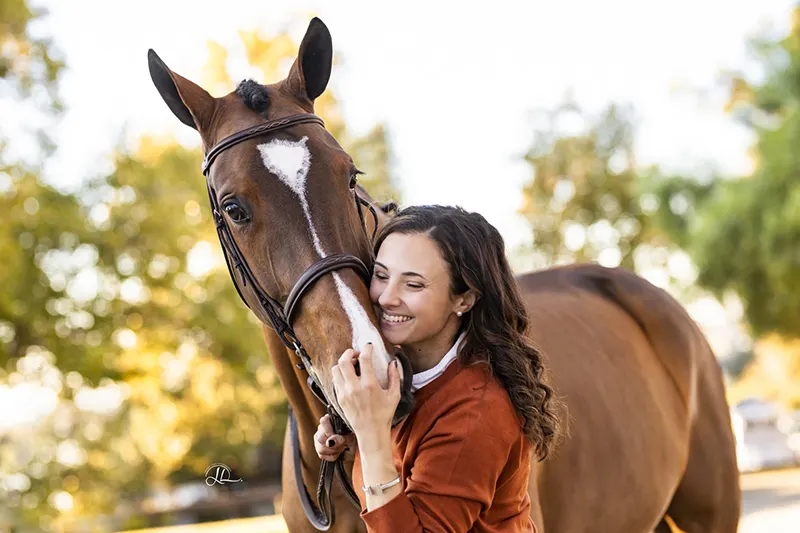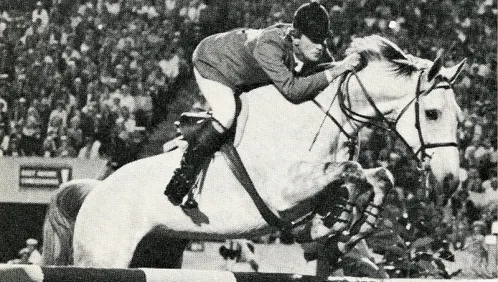Name: Sara Zimmerman
Age: 32
Occupation: Employment defense attorney
At a recent horse show, amateur rider and professional attorney Sara Zimmerman found herself with a major scheduling conflict: It was time to go into the ring, but she was still on an extended conference call for work. Her solution? Hand her phone off to her horse’s groom, ride her round, and get back on the call as quickly as humanly possible.
“It’s not always that crazy,” said 32-year-old Zimmerman with a laugh, “but that pretty much exemplifies my attempts to juggle work with horse showing. I also bring a hotspot to my barn’s setup, and sometimes I have dual monitors arranged in my hotel room if it’s an out-of-town show.”
It’s not just scheduling conflicts that are challenging but also the vastly different skill sets needed for work and riding.
“When I’m at work, things are black and white,” Zimmerman said. “I’m getting paid to argue on behalf of my client and explain why the facts support a particular argument. But then I come to the barn, and Jeremy doesn’t always agree with me. There’s a lot more nuance.”
“Jeremy” is Zimmerman’s 12-year-old Dutch Warmblood gelding, whose show name is All In Favor. She purchased him in 2020, and they most often compete in the equitation ring but have also shown in the hunters and jumpers.

Sara Zimmerman and All In Favor competing in the 3′ adult equitation division at the October Temecula Valley National Horse Show (California). Captured Moment Photography
Zimmerman, Irvine, California, fell in love with horses at a young age. She took lessons and half-leased a horse in high school but couldn’t afford horse ownership until she began working as a lawyer.
ADVERTISEMENT
As if balancing work and riding wasn’t difficult enough, Zimmerman’s young professional life involved something else that demanded her full attention: In her mid-20s she was diagnosed with an eating disorder. It was horses that motivated her to address it head on.
“I almost passed out in a lesson and had to excuse myself,” she said. “That’s when I knew I had a problem.”
Zimmerman began therapy and sessions with a dietitian, and in 2017 she completed her first intensive outpatient program, which consisted of seven to eight hours a day of treatment, six days a week. While she wasn’t able to ride very much during that time, she would visit the barn in the evenings just to be near the horses.
“Even when things were really tough, and I didn’t think that I deserved to get better, when I was with horses I felt like things were going to be OK,” she said. “They were the least judgmental part of my life.”
In 2020, Zimmerman’s condition took a turn for the worse, and her therapist recommended residential treatment. But by this time, she had purchased her first horse, Nemo.
“My biggest concern was leaving Nemo. It was so hard for that reason, but it was also a huge motivator to get things right and work hard at recovery,” she said. “I finally had something so much more important to me. I had worked so hard to get a horse, and now I was so sick that I was missing out on being with him. When you’re in treatment you don’t get to use phones very often, but my therapist let me Facetime my trainer, who put Nemo on the phone while I was there.”

“Horses help us to let go and live in the moment,” says Zimmerman, here with “Jeremy.” Lindsey Long Photo
Zimmerman hasn’t had to go back to residential treatment, but her recovery is ongoing. While many riders would agree it’s difficult to eat healthy meals while horse showing, for Zimmerman it requires specific, significant thought and planning. She has to make a conscious effort to sit down and eat.
ADVERTISEMENT
The demands of her legal career mean Zimmerman does not get to ride and show as often as she’d like, but she is grateful just to own a horse.
“It’s hard not to be envious of people who have more time to spend riding and showing, but then I also have to remember I don’t know anything about their lives,” she said. “I always wanted to be a lawyer. I love working, and my career is a big part of my life, and I’m also fortunate enough to be able to ride.”
Zimmerman enjoys competing but does not have specific goals in terms of divisions or height.
“I just truly want to have fun,” she said. “My life is not going to look like the glamorous amateurs who are always in the winner’s circle. The show circuit is never going to be my whole life or even a substantial part of my life, but being involved at all has helped me appreciate what I have. If I can’t show, or can only show a few times a year, that’s fine with me. It’s more than enough.”
Zimmerman defines success as worrying less and putting less pressure on herself. Not only have horses provided the motivation for her to be healthy, but they’ve also helped her learn to be flexible and develop a mindset to assist her recovery.
“It’s a work in progress, and success looks different every single day, but that’s kind of the same with horses and riding,” she said. “Disordered eating is often about control, and it’s a balancing act to make sure I’m meeting my health needs but also not worrying too much or overthinking everything. It’s really the same with riding, finding the balance of what you need to do to communicate with your horse but not over-riding or nitpicking. Horses help us to let go and live in the moment.”
As long as she’s able to spend time with horses, Zimmerman is optimistic about the future. “Horses saved my life, and are my life,” she said. “I wouldn’t have it any other way.”














